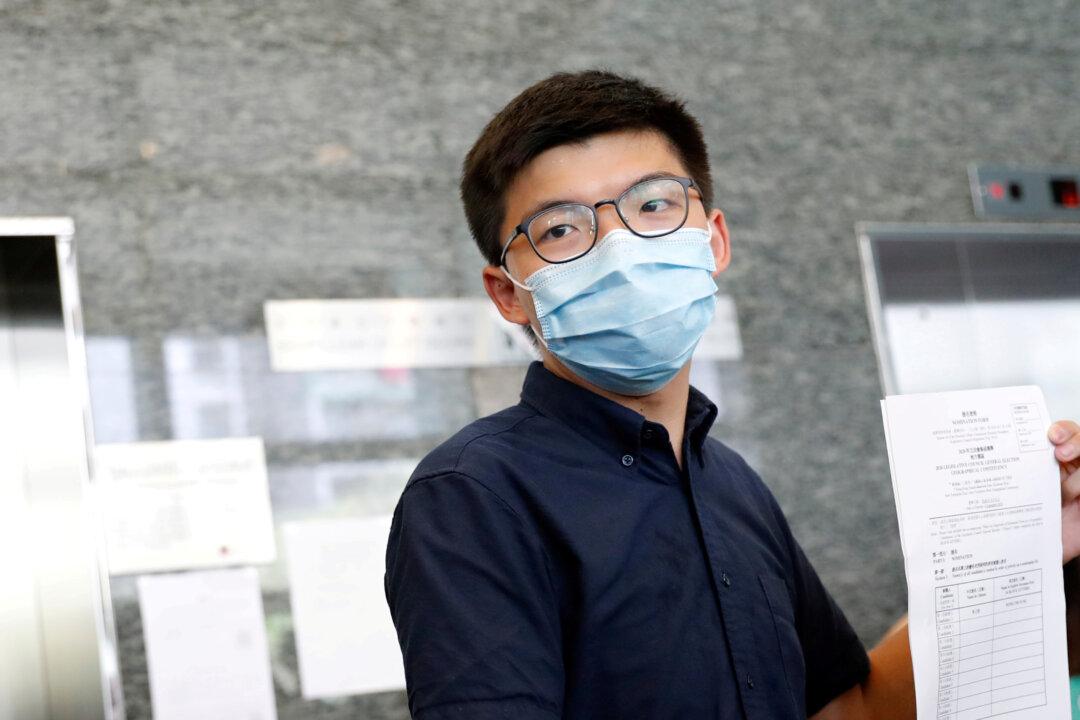HONG KONG—Hong Kong police have brought pro-democracy activists Joshua Wong and Tam Tak-chi for questioning for violating Hong Kong’s pro-Beijing National Security Law, increasing the total number of arrests using the Beijing-backed law from 53 to 55.
Both were in police custody when they were taken into questioning on Thursday.
Wong, former secretary-general of local pro-democracy party Demosistō, has been serving a sentence in Shek Pik Prison. Tam, a former radio presenter nicknamed “fast beat” and vice chairman of the pro-democracy party People Power, has been detained at the Lai Chi Kok Reception Center since September last year.
Although Wong and Tam were in custody, Hong Kong police stated that they were arrested again due to their running in the 2020 primary elections for the pan-democracy camp. Since the two were already serving a sentence in detention, there was no need for bail or reporting to a police station.
Both Wong and Tam were both candidates in the primary elections. The elections were held on July 11 and July 12 last year ahead of the Legislative Council (LegCo) elections, initially scheduled for September. But they have since been indefinitely postponed.
The pan-democratic primary was the first-ever grassroots effort bringing together all democratic parties in Hong Kong in the hopes of winning a majority of more than 35 seats in the LegCo. Over 600,000 Hongkongers cast their ballot in the primary vote.
Before arresting Wong and Tam, the Hong Kong police arrested 53 opposition figures on Jan. 6 over their participation in the primary race, charging them “subversion” according to Article 22 of the National Security Law. The Hong Kong National Security Office dispatched about 1,000 police officers to execute the mass arrest, the largest since implementing the Hong Kong National Security Law on July 1, 2020.
Most of those arrested were released on bail the next day. They were required to pay bail of HK$30,000 ($3,865) to HK$50,000 ($6,441), surrender their travel documents, and are not permitted to leave Hong Kong for the next six months.
Nathan Law, Sunny Cheung, and Ted Hui—Hong Kong primary candidates in exile—issued a statement on Facebook on Jan. 6: “The unprecedented scale indicates how the communist government has decided to purge the democratic camp, silencing all dissent. White terror stems from the ambiguity of the law; it threatens all 600,000 Hongkongers who had cast their vote.”
According to a Jan. 7 update posted by supporters on Joshua Wong’s Facebook page: “The welfare officer of the Correctional Services Department notified Joshua Wong’s family that Joshua was transferred from Shek Pik Prison to Lai Chi Kok Correctional Institution this morning to record a statement. He was charged with violating the Hong Kong National Security Law.”
The post said that Wong’s lawyer was not present as Wong recorded his statement. And when the lawyer arrived, Wong had already been returned to prison.
Wong was dressed in prison clothes, handcuffed with chains around his waist—a look similar to how the founder of Next Media, Jimmy Lai, appeared at a recent trial. Lai was back in custody after he was denied bail on Dec. 31 last year.
Joshua Wong was jailed on Dec. 1 for his role in the anti-government protests of 2019. His sentence is for 13 and a half months.
Tam Tak-chi has been in detention since September 2020. He was charged with incitement over his shouting of slogans such as “Liberate Hong Kong, Revolution of Our Times” and “Five Demands, Not One Less” on the street.



